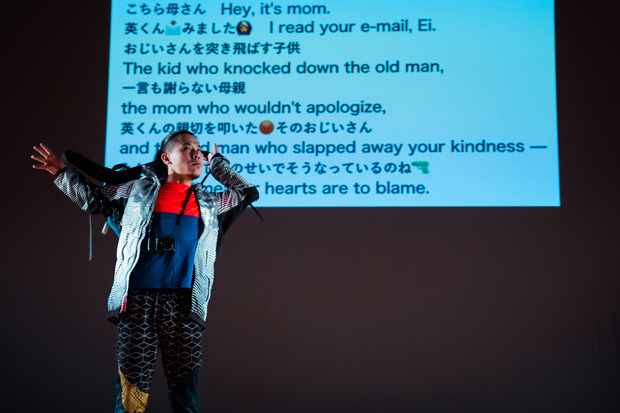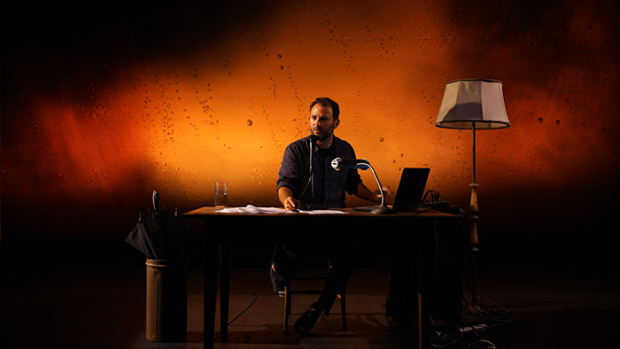Under the Radar 2020: The Unknown Dancer in the Neighborhood and The Truth Has Changed
Pieces by Suguru Yamamoto and documentarian Josh Fox join the Public Theater’s annual festival of new works.

(© Ayumi Sakamoto)
The Unknown Dancer in the Neighborhood
by Kenji Fujishima
Suguru Yamamoto's new dance theater piece The Unknown Dancer in the Neighborhood is more than just a damning mosaic of modern Japanese life; it's a cry of frustration from an artist who feels alienated from his fellow man. According to Yamamoto, contemporary Japan is pockmarked with apathy, with inhabitants so wrapped up in their own lives that they can't, or won't, connect with others even in response to violent tragedy.
It's a familiar view of soulless urban life, but the cultural specifics and Yamamoto's psychological incisiveness give the piece its distinction. Set mostly in Nagai, frequently referred to as "the most dangerous place in Japan," The Unknown Dancer depicts indignities of all sorts: A girl falls onto train tracks and only one young boy is willing to try to save her; a stripper is stabbed to death late at night after her shift; and a massive hostage crisis ends with the deaths of all 30 hostages. In such a bleak environment, it makes sense that, as Yamamoto subtly hints, the younger generation may grow up to be as disaffected as their elders have become.
The Unknown Dancer is also distinguished by its formal elements. It's a solo performance in which virtuosic dancer and actor Wataru Kitao embodies not only all of the characters, but also animals and objects. Sometimes Kitao interacts with other people who are represented by projections of dialogue in the manner of text-message bubbles (Takaki Sudo designed the video projections, which at times includes aerial footage of the Japanese skyline). Though much of the performance simply consists of Kitao holding the stage with his quicksilver character transitions and graceful movements, Junko Miyazaki's sound design does occasionally include songs on the soundtrack — many of them non-Japanese — to underscore certain moments and characterizations.
Once one gets past the initial confusion of trying to keep straight the various characters Kitao embodies, Yamamoto's solo-performer conceit becomes poignant: one lone figure trying his best to grasp the vast human indifference surrounding him. As dark a world as The Unknown Dancer paints, however, Yamamoto's vision is hardly defeatist. Instead, it's the sheer clarity with which Yamamoto excavates, analyzes, and dramatizes the underlying despair and desire for connection that is most heartening. In its own way, The Unknown Dancer is the playwright's own unsentimental call for empathy in a society that teeters on the brink of losing its way amid the blight of modernization.

(© International Wow Company)
by Hayley Levitt
If you Google "Josh Fox," one of the first search results is a video of him being put in handcuffs at a Congressional hearing on fracking that he attempted to film in 2012. Consider this your trigger warning for The Truth Has Changed, a brutally honest, no-holds-barred, emergency siren of a solo show that the Oscar-nominated documentarian and environmental activist has brought to this year's Under the Radar Festival.
He warms us up with a little banjo music, playing the English drinking song "To Anacreon in Heaven," which we learn later contributed the melody for "The Star-Spangled Banner" — a lesson in how our noble city upon a hill was crafted by foreigners over a pint. From there, it's full steam ahead in a relentless cavalcade of anecdotes and information. Fox takes a seat behind a desk where he controls his menacing sound effects from a laptop while recounting America's historical tendency toward misinformation, manipulation, and warmongering, all in the name of oil wealth.
He talks about his own experiences after 9/11 delivering food to first responders with a group of fellow theater artists, who only lived to tell the tale because the apocalyptic play they were putting on happened to include gas masks (they happily used them despite President George W. Bush's reassuring claims that the city air was safe to breathe). He then discusses his 2010 documentary Gasland, which was met with fire and fury (to repurpose a quote from our current president) by oil and gas lobbyists, who went so far as to produce their own counter-documentary, TruthLand.
Those dots are then connected to the imminent demise of the globe via climate change, the fake news terrorism that has brought about the rise in fascist leadership around the world, and the failure of social media moguls like Mark Zuckerberg to do a damn thing about it (cue a fabulous interrogation scene between Zuckerberg and Alexandria Ocasio-Cortez that plays on the massive projection screen behind Fox).
It's a lot of information to take in, both mentally and emotionally. And while your brain may stall a few times, Fox is an ideal narrator who grabs you by the hand and pulls you along for the entirety of the overwhelming proceedings, whether you like it or not. There are only a few performative bells and whistles (one being a dance break to "Singin' in the Rain"), making the piece feel more like a staged documentary than a theatrical work. But if you're going to consume 90 minutes of meaty journalism, it's refreshing to feel confident that you're being told the truth.








